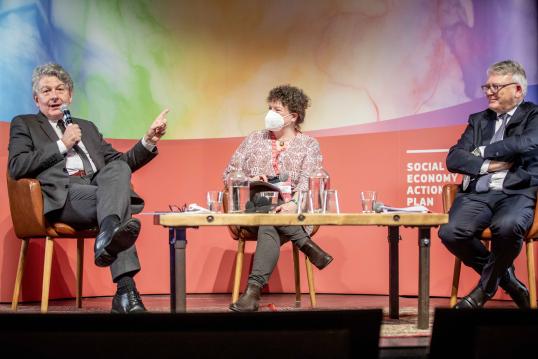Social Economy Action Plan (SEAP)
On 9 December 2021, the European Commission adopted a new action plan for the social economy.
It aims to
- create the right framework conditions for the social economy to thrive
- open up opportunities (including access to finance) and support for capacity building
- enhance recognition of the social economy and its potential
The action plan has a time horizon until 2030, with a mid-term review scheduled for 2025.
Council recommendation on social economy framework conditions
As part of the implementation of the action plan for the social economy, the Commission adopted a proposal for a Council recommendation on developing social economy framework conditions on 13 June 2023.
The Council formally adopted the recommendation on 27 November 2023. The final text can be found here.
Proposal for a directive on European cross-border associations
A proposal to facilitate cross-border activities of non-profit associations in the EU was adopted by the European Commission on 5 September.
This initiative seeks to ensure full single market freedoms for associations, simplifying their cross-EU activities and promoting their fundamental rights. More information is available here.
Current rules create obstacles, such as additional registrations, when associations operate across EU borders. This may distort the market for non-profit organisations and affect the EU's democratic space and the exercise of EU fundamental rights.
To learn more about this issue, read this comparative legal analysis of associations laws and regimes in the EU.
Youth Entrepreneurship Policy Academy
The Youth Entrepreneurship Policy Academy (YEPA) is a policy learning network of 150 participants, including policymakers, youth entrepreneurship networks and organisations, social entrepreneurship networks, programme managers and researchers.
YEPA aims to strengthen youth entrepreneurship policies and programmes by increasing knowledge about the barriers faced by young people in entrepreneurship and facilitating exchange between policy makers, young entrepreneurs and experts on “what works” in youth entrepreneurship policy.
YEPA is one of the 10 key actions of the social economy action plan and it aims to raise awareness of social entrepreneurship in the broader context of promoting youth entrepreneurship. Online capacity building events are regularly organised (on access to finance, green transition, women entrepreneurship, social entrepreneurship, etc.). Do not hesitate to register on the YEPA Hub events page.
Transition pathways
In May 2021, the European Commission updated its Industrial Strategy to support the transformation to a more sustainable, digital, resilient and globally competitive economy, notably in the post-COVID-19 recovery context. Building on an ecosystem-based approach, the new updated strategy called for stakeholder involvement in the development of transition pathways for the 14 industrial ecosystems. The SEAP reaffirmed the ambition to launch a transition pathway for the proximity and social economy ecosystem to maximise the contribution of its organisations to the green and digital transitions.
Following a co-creation process, the Commission published its transition pathway for the proximity and social economy ecosystem on 14 November 2022. Based on 14 areas of action, the pathway pinpoints avenues of action for a strengthened and more resilient social economy ecosystem in the context of the ongoing twin transition. Ranging from business-to-business collaboration and multi-stakeholder partnerships to investment in infrastructure and access to innovation and technology, the pathway puts forward a set of measures, identifies the relevant actors and the timeframe for their implementation.
As part of the co-implementation phase which started with the publication of the pathway, the Commission has launched a call for pledges aiming at collecting concrete actions that social economy organisations and other relevant stakeholders will undertake to help achieve the actions laid out in the pathway. Pledges will be collected and assessed on a rolling basis. Click on the button below to see the next deadline for submitting your pledges.
Transition pathway Platform
To support stakeholders in their work on the twin transitions, the European Commission has launched a transition pathway stakeholder collaboration platform that will facilitate exchanges with and between stakeholders and pledgers.The platform has been launched on 9 December 2024.
Online launch event on 6 February 2025, 14.00 - 16.30
Kick-off for the EU Proximity and Social Economy Platform
Code of Conduct for data management and data sharing in the social economy
One of the actions announced in the social economy action plan is to “develop a code of conduct on data use and management in the social economy, in cooperation with stakeholders to support the uptake of data and technology”.
This ambition was reiterated in the transition pathway for the green and digital transition of the proximity and social economy industrial ecosystem, under action area 11 “Data sharing, data management & code of conduct”.
This process was launched by a call for expression of interest in 2023 to mobilise private and public stakeholdersto engage in this process, supported and facilitated by the European Commission services through an external contractor. Find more information here.
Event: Presentation of the Code on 28 November 2024
Consultations
Below is a list of European Commission consultations that may be relevant to social economy actors.
| Call for evidence – EU Start-up and Scale-up Strategy | 17 February 2025 - 17 March 2025 | Learn more |
7 public consultations regarding the next EU long-term budget (Multiannual Financial Framework 2028-2034 (MFF)):
| 12 February 2025 - 7 May 2025 | Learn more |
| Public consultation (OPC) and call for evidence for the evaluation of the Public Procurement Directives | 13 December 2024 – 7 March 2025 | Learn more |
| Public consultation for the interim evaluation of the Single Market Programme 2021-2027 | 8 March 2024 – 31 May 2024 | Learn more |
| Call for Expression of Interest to join the drafting committee developing a “Code of Conduct for data management and data sharing in the social economy” | until 5 January 2024 | Learn more |
| Public consultation on the European Social Fund and the Youth Employment Initiative | 30 October 2023 – 9 January 2024 | Learn more |
| Public consultation to evaluate the European Labour Authority’s performance | 7 November 2023 – 5 January 2024 | Learn more |
| Public consultation on the proposal to facilitate cross-border activities of non-profit associations in the EU | 6 September 2023 – 28 November 2023 | Learn more |
Previous policy developments
- March 2021European Pillar of Social Rights Action Plan
Find out more about the European Pillar of Social Rights Action Plan here
- 2019 - 2021Evidence gathering for the Social Economy Action Plan
The results of the evidence gathering and consultations in preparation for the action plan are summarised in the corresponding Staff Working Document.
- 2016Start-up and Scale-up initiative
The Commission is determined to supporting social economy ecosystems. The start-up and scale-up initiativewas launched in 2016. It aims to give Europe's many innovative entrepreneurs every opportunity to become world leading companies. The main proposals of the start-up and scale-up initiative are:
- to remove barriers for start-ups to scale up in the single market
- to create better opportunities for partnership, commercial opportunities and skills
- to facilitate the access to finance
- 2015Council conclusions on social economy
- 2011Social Business Intitiative
The social business initiative, launched in 2011, aimed to introduce a short-term action plan to support the development of social enterprises, key stakeholders in the social economy and social innovation. It also aimed to prompt a debate on the avenues to be explored in the medium/long term. It included 11 priority measures, organised around 3 themes:
- Theme 1: Making it easier for social enterprises to obtain funding
- Theme 2: Increasing the visibility of social entrepreneurship
- Theme 3: Making the legal environment friendlier for social enterprises
For more information, including the list of actions, click here.
Who is working on social economy in the EU Institutions?
European Commission
As of 1 December 2024 Roxana Mînzatu, EXECUTIVE VICE-PRESIDENT Executive for Social Rights and Skills, Quality Jobs and Preparedness is responsible for social economy.

As the Commission adopts decisions collectively, other Commissioners are involved as well, in particular Stéphane Séjourné, EXECUTIVE VICE-PRESIDENT for Prosperity and Industrial Strategy.
In the previous Commission mandate (2019-2024) three Commissioners were responsible for the social economy-related matters: Nicolas Schmit, Commissioner for Jobs and Social Rights, Thierry Breton, Commissioner for Internal Market, Valdis Dombrovskis, Executive Vice-President and Commissioner for an Economy that Works for People.

At working level, the Directorate-General for Employment, Social Affairs and Inclusion (DG EMPL) and the Directorate-General for Internal Market, Industry, Entrepreneurship and SMEs (DG GROW) are leading the work on social economy. However, due to the transversal nature of the social economy, several other Directorate-Generals are involved.
GECES expert group
The expert group on social economy and social enterprises (GECES) advises the Commission on topics related to the social economy, raises awareness at the national level of EU actions, and promotes exchanges of best practices between Member States. The group has been renewed until 2030.
European Parliament
In the European Parliament, the Intergroup on Social Economy aims to ensure a permanent dialogue between the European Institutions, Member States and the social economy sector, and to mainstream the social economy perspective into the legislative and non-legislative work of the European Parliament.
Committees
The European Committee of the Regions and the European Economic and Social Committee are also involved in the work on social economy:
- On 8 February 2023, the European Committee of the Regions adopted an opinion on 'Creating an enabling environment for the social economy', underlining the strong local anchorage of the social economy. It also has adopted opinions on
- The European Economic and Social Committee has adopted opinions on the action plan for the social economy (2022), on taxation frameworks for the social economy (2024), on the potential of public procurement for the social economy (2024) and on the role of social economy in the creation of jobs and in the implementation of the European Pillar of Social Rights (2021). The Committee also hosts the Social Economy Category, a group that has encouraged the mainstreaming of the Social Economy in the Committee's opinions and other activities, as well as initiated a number of commissioned studies on the sector.
EU Member States
The Monitoring Committee for the Luxembourg Declaration
The Monitoring Committee was set up following the adoption of the Luxembourg declaration (“A roadmap towards a more comprehensive ecosystem for social economy enterprises”) under the Luxembourgish Presidency of the Council of the EU in 2015. It serves as an informal forum for EU ministers competent for the social economy to exchange experience and share information on respective initiatives. More countries have gradually joined the group, which today comprises 23 countries. Bulgaria held the presidency of the Monitoring Committee in 2023, followed by Belgium in 2024.

